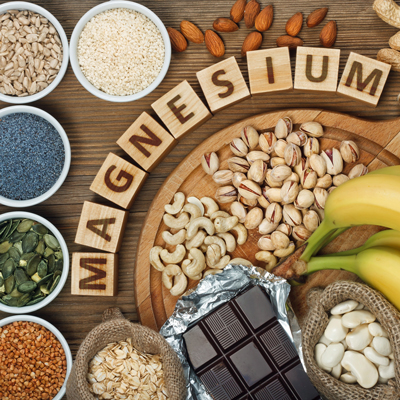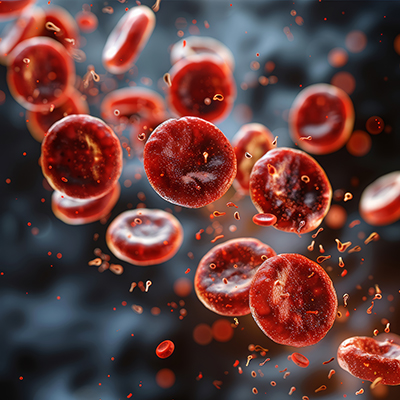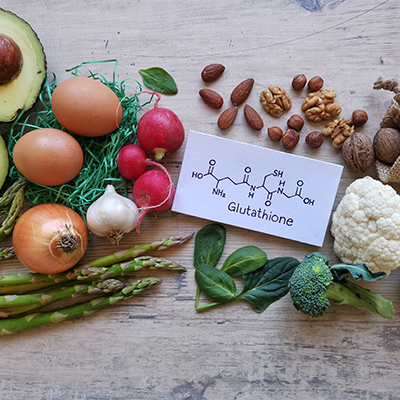Metabolism
All information about "Metabolism" and the related magazine articles can be found here.
Our articles are written clearly and link to scientific studies where relevant. This is how we meet our own standards: we regularly deliver new, high-quality content for you—free of charge, no sign-up required, with the highest possible benefit to you.

Start spring naturally fit with L-citrulline & cordyceps and recharge your batteries
Experience the invigorating power of nature and science. For new energy, strong blood vessels and mental freshness. Ideal for anyone who wants to get off to a powerful start.
The days are getting longer, the light is returning and now is the time to give your body a gentle boost. The combination of L-citrulline, an amino acid that promotes blood circulation, and the vital mushroom cordyceps supports you in a natural way. For more performance, better focus and an all-round vital body feeling.

Moving through spring: supporting joints naturally with MSM, glucosamine and chondroitin
Find out how your joints work - and how targeted nutrients, exercise and high-quality supplements can promote your mobility.
Movement is often difficult after winter. Stiff joints and limited range of motion are not uncommon. Natural active ingredients such as MSM, glucosamine and chondroitin can help to support normal joint function and prevent discomfort. Now is the ideal time to get going with renewed energy. Moving, vital and well nourished into spring.

Vitamin D3 and K2: the perfect combination for bones and well-being
Find out why vitamin D3 and K2 are so important, especially in the dark season, and how they support your immune system and bone health.
Vitamin D3 helps to banish the winter blues, while vitamin K2 promotes the optimal utilization of calcium. Discover the best food sources and find out when targeted supplementation can be useful.

Stopping cravings: How chromium stabilizes your blood sugar levels
Find out why the trace element chromium can reduce cravings and how it supports your metabolism.
Chromium helps regulate blood sugar levels, helps prevent sudden hunger and promotes long-term wellbeing. Discover the benefits of this important nutrient and find out how you can specifically integrate it into your diet!

Thanks to bitter substances and enzymes, a naturally spring-fit and healthy digestion
Find out how bitter substances and enzymes stimulate your digestion, alleviate digestive problems and gently balance the gastrointestinal tract.
Bitters and enzymes naturally support digestion, relieve bloating and promote general well-being. Discover how you can get off to a fresh and stomach-friendly start with bitter foods, the right diet and high-quality food supplements. For a good gut feeling, day after day.

Clear head, full focus - with ginseng & ginkgo
More concentration, less stress: Natural support for everyday life
Spring brings fresh energy - but sometimes your head feels foggy rather than clear? Ginseng and ginkgo are proven plants that can help boost focus and mental performance. Whether for learning, at work or simply for more mental freshness - discover how this power combination can take your concentration to a new level!

Springtime is liver time! How milk thistle & choline take the strain off your liver
Find out how choline, milk thistle and a conscious diet regenerate your liver and support your metabolism in a natural way.
After months of heavy eating, your liver also needs a break. Choline and milk thistle promote natural detoxification, strengthen the fat metabolism and provide fresh energy for body and mind. Discover how you can make your liver fit for spring with targeted nutrition and vital substances. Scientifically sound and naturally effective.

Iron deficiency? How iron tablets support your vitality
In the cold season, a sufficient iron level is particularly important for energy, blood formation and well-being.
Find out which iron supplements optimally support the body, what you should pay attention to when taking them and how you can specifically prevent iron deficiency. For more strength and vitality in winter!

Strengthening the immune system in the cold season. Magnesium as a key mineral
Find out why magnesium is essential for a strong immune system and how you can optimally cover your requirements.
Especially in the cold season, magnesium supports the body's own defenses, ensures normal muscle function and helps to maintain energy. Discover magnesium-rich foods and practical nutrition tips for resilient health in winter!

Detox cure with L-arginine: Detoxify & recharge your energy
Find out how L-arginine supports your detoxification, boosts your metabolism and improves your athletic performance.
With a 5-day detox plan, you can cleanse your body in a targeted manner, promote blood circulation and increase your well-being. For more energy and an all-round good feeling!

Goodbye winter skin: Radiant skin with biotin, hyaluronic acid & omega-3
Discover the best nutrients for supple and resilient skin in the cold season.
Biotin promotes skin renewal, hyaluronic acid provides deep moisture and omega-3 strengthens the skin's protective barrier. Find out how you can optimally care for your skin and enjoy the winter with a radiant complexion!

Support hormonal balance in spring naturally with monk's pepper and vitamin B6
For a stable cycle and greater well-being
Spring brings change - also for the hormone balance. Monk's pepper and vitamin B6 can help to alleviate PMS symptoms and regulate the menstrual cycle. Discover natural ways for more balance and well-being!

Radiant skin in spring with zinc and OPC
Support skin renewal and bring back the natural glow
Now that spring is here, your skin needs new energy. Find out how you can improve the appearance of your skin with targeted care, zinc and OPC - for a fresh, radiant complexion in spring. Find out more now!

Winter salad with chia: Superfood for the cold season
Discover delicious and nutritious winter salad recipes with chia seeds, turmeric and fresh winter vegetables.
Chia provides valuable omega-3 fatty acids and fiber, while crunchy ingredients ensure enjoyment and variety. Be inspired and enjoy healthy, delicious salads in winter!

More oxygen, more energy: Iron and vitamin C as a spring turbo
Are you already feeling the spring, but not yet at full power?
Maybe your body is missing just the right combination of iron and vitamin C! Find out why these two nutrients can increase your blood oxygen saturation - and how you can regain your vitality in no time at all. Leave fatigue behind and start the warm season with fresh energy!

Activate metabolism for more energy with L-carnitine & omega-3
How to keep your body active without dieting stress
Spring is calling, and with it comes the desire for more energy and a fit body. L-carnitine and omega-3 fatty acids can gently support your metabolism by boosting fat burning and reducing oxidative stress. Find out why now is the perfect time to give your system a boost!

Support for Picky Eaters
When children's picky eating behavior endangers the nutrient supply
Does your child consistently refuse vegetables and only accepts a handful of foods? Here you can find out what is behind the so-called “picky eater syndrome”, why vitamin C is so essential for children's development and which tricks help to defuse picky eating behavior without pressure.

Liver detox with L-glutathione: fresh energy for spring!
Gentle detoxification instead of a crash cure - how L-glutathione supports the liver
The liver filters toxins out of the body and optimally utilizes nutrients. But how can you strengthen it naturally without going on extreme detox cures? Discover here what glutathione has to do with the liver and which simple home remedies can help with “spring cleaning” from the inside.

Winter cabbage & iron: Powerful nutrients for the cold season
Find out how winter cabbage, vitamin C and iron-rich foods support your health and provide your body with optimum care.
Winter cabbage provides valuable iron, which is absorbed even better with vitamin C. Discover delicious recipes and nutrition tips to keep you fit and full of energy throughout the winter!

Protection for your mucous membranes with vitamin B3 (niacin)
Cold air outside, dry heating air inside - this can put a strain on mucous membranes
Find out how micronutrients such as niacin (vitamin B3) can help to support the natural barrier function of the mucous membranes and effectively counteract dryness. An adequate supply of vitamin B3 can help to maintain the well-being of your skin and mucous membranes during the cold season.

Sleeping problems in winter? How magnesium supports your sleep!
How magnesium can contribute to a relaxed night
Winter not only brings cold temperatures, but often also restless nights. Many people toss and turn in bed, struggle with muscle tension or wake up tired in the morning despite getting enough sleep. Magnesium is an essential nutrient that plays a role in muscle relaxation and the sleep-wake rhythm. In this article, you will find out which magnesium supplements are suitable for the evening hours and how you can promote a restful night's sleep with simple routines.

More energy in winter: Ashwagandha as natural support
How the adaptogen can help alleviate the winter blues.
The dark season can not only dampen your mood, but also cause persistent tiredness and listlessness. When energy is lacking and exhaustion remains even after a good night's sleep, the right support for body and mind may be lacking. Ashwagandha is a traditional adaptogen that can help promote inner calm and stabilize the sleep-wake cycle. Find out how you can support your well-being in winter with simple measures and a targeted supply of nutrients.

Constant tiredness despite sleep? How vitamin B complex gives you new energy
More energy, better concentration and less fatigue - this is how B vitamins support your body in winter.
Do you know the feeling of waking up completely exhausted in the morning, even though you've actually had enough sleep? Winter fatigue often robs us of energy, especially in the darker months of the year. The good news is that your body can do more than you think - it just needs the right stimuli! Find out how a vitamin B complex can help you reduce fatigue, boost concentration and get through the winter with more energy. Read now how you can specifically support your energy metabolism!

Strengthen your family with a vitamin boost in winter
Little sunlight, fluctuating temperatures and waves of colds challenge the immune system. Find out how you can get through the cold season healthy and full of energy with vitamin C!
Find out which symptoms indicate a vitamin C deficiency, which foods are real vitamin C bombs and how you can easily integrate your daily intake into your everyday life. Whether for parents, children or older people - with the right nutrients, the whole family can stay strong!
Understanding your metabolism: What you need to know to optimize it
Have you ever wondered why some people seem to stay slim effortlessly, while others constantly struggle with their weight? Or why you feel energized after certain meals and just tired after others? The key to these mysteries may lie in your metabolism!
How does the metabolism in our body work?
Metabolism, also known as metabolism, comprises all the biochemical processes in our body that are necessary to generate, store and use energy [1]. It is important because it supports vital functions such as respiration, digestion, cell repair and growth.
It consists of two main processes: anabolic (building up) and catabolic (breaking down) energy metabolism. In anabolic metabolism, molecules are built up and energy is stored, while catabolic metabolism breaks down larger molecules into smaller ones to release energy [3,4]. These processes take place continuously, even when we sleep.
What factors influence the metabolism?
Energy metabolism is influenced by various factors, including age, gender, genetics, muscle mass, hormonal balance and lifestyle factors such as diet and physical activity. With increasing age, energy metabolism tends to decrease, while muscle mass and physical activity can have a reverse effect [2].
Can you really speed up your metabolism?
Yes, the biochemical processes can be accelerated by various measures. Regular physical activity, especially strength training, can promote muscle building, stimulate fat burning and effectively increase the basal metabolic rate. Certain foods and spices such as green tea, hot peppers and protein-rich foods can also cause a small increase in fat metabolism by activating enzymes that support the breakdown of carbohydrates [2]. L-carnitine, for example, can support fat burning.
Which foods promote a healthy metabolism?
Foods that are rich in protein, fiber and healthy fats promote a healthy metabolism. These include [2]:
- Lean meat such as chicken and turkey
- Fish such as salmon and mackerel, eggs
- Nuts such as almonds and walnuts
- Seeds such as chia seeds and linseed
- Whole grain products
- A variety of fruit and vegetables
How does exercise affect the metabolism?
Exercise, especially intensive training and strength training, increases energy expenditure both during exercise and during rest periods afterwards. Regular physical activity helps to build muscle mass, which increases basal metabolic rate and boosts energy metabolism in the long term [2]. Aerobic exercises such as running, swimming or cycling are also effective in improving energy metabolism [2].
What are the most common metabolic disorders and their symptoms?
Zu den häufigsten Stoffwechselstörungen gehören [5,6,7]:
- Hypothyroidism (underactive thyroid gland): Symptoms may include fatigue, weight gain, sensitivity to cold and depression.
- Hyperthyroidism (overactive thyroid): Symptoms include weight loss, nervousness, excessive sweating and palpitations.
- Diabetes mellitus: symptoms include increased thirst, frequent urination, tiredness and blurred vision. Here you can find out what diabetics should not eat.
- Metabolic syndrome: symptoms include obesity, high blood pressure, high blood sugar levels and high cholesterol levels.
If a metabolic disorder leads to obesity, this can cause a number of secondary diseases, including osteoarthritis. Osteoarthritis is a joint disease caused by the breakdown of cartilage.
Did you know that the trace element selenium can regulate thyroid hormones as an important antioxidant? Find out more about it here,
How do hormones influence the metabolism?
Hormones such as insulin, thyroxine, cortisol and adrenaline play a central role in the regulation of metabolism [8]. Insulin regulates blood sugar levels and promotes the uptake of glucose into the cells. Thyroxine influences energy consumption and the body's basal metabolic rate. Cortisol, also known as the stress hormone, regulates sugar and fat metabolism and can slow down energy metabolism if it is chronically elevated. Adrenaline, also known as the fight or flight hormone, mobilizes energy reserves and temporarily increases energy expenditure [2].
Vitamins can also play a role. You can find out more about vitamin B6 and its influence on processes in the body here.
What role does the metabolism play in weight loss?
Energy metabolism determines how many calories the body burns at rest and during activity. A higher metabolism means that the body uses energy more efficiently and burns more calories, which helps with weight loss. Food intake and exercise are key strategies to optimize biochemical processes and support weight loss. A balanced diet with a moderate calorie deficit and regular exercise is crucial for successful long-term weight loss [2].
Which myths about metabolism are widespread?
A common myth is that people with a slow metabolism cannot lose weight. In fact, food intake and exercise play a greater role than the individual's metabolism.
Another myth is that small, frequent meals can greatly boost a poor metabolism, although the effect on overall metabolism is minimal. Instead, the quality and composition of food, as well as the total amount of calories consumed, is crucial for metabolic health and weight management [2].
While certain foods and activities can slightly increase energy metabolism in the short term, the effect is often minimal and not long-term. The basal metabolic rate is mainly determined by factors such as muscle mass, age and gender.
Which metabolic type am I?
The classification into different metabolic types is an approach that attempts to explain individual differences in energy consumption and energy metabolism. People respond differently to diet and exercise, partly due to genetic factors. Some tend to gain weight easily, while others tend to stay lean, regardless of their diet. Metabolic type can influence how efficiently the body utilizes nutrients and burns energy. Although this typing is not always clear-cut and individual variations are large, it can help to adapt personal diet and fitness strategies to achieve health goals [2].
There are various approaches to classifying metabolic types, but no universally recognized typology exists. The classification into specific metabolic types is scientifically controversial and not clearly proven. Although individual metabolic differences exist, they cannot simply be divided into fixed categories. Here are some frequently discussed metabolic types [9]:
- Ectomorph: People of this type tend to be lean and often have difficulty gaining weight. They usually have an active metabolism and burn calories quickly.
- Mesomorph: Mesomorphs are often athletically built, have good muscle definition and can build muscle relatively easily. They often have a balanced metabolic process.
- Endomorphic: Endomorphic types tend to put on fat easily and often have difficulty losing weight. They usually have a slower metabolism.
- Metabolic types based on food reactions: Some classifications are based on how the body reacts to different foods. For example, people may react differently to high carbohydrate, high protein or high fat diets, which affects their metabolic type.
- Genetic and hormonal differences: Some approaches consider genetic and hormonal factors that may cause impaired metabolism, such as insulin sensitivity, thyroid function and other hormonal regulation [2]. Genetic factors play a role, but lifestyle factors such as diet and exercise often have a greater influence.
It is important to note that metabolic types are often a mixture of different characteristics and are not clearly delineated. Determining an individual's metabolic type can therefore be a complex matter and often requires an individualized approach, taking into account various factors such as genetics, lifestyle, dietary habits and physical activity [2].
Guide to determining your metabolic type and how to use it
Self-observation and analysis
Start by observing your physical reactions to different diets and activity levels. Note how you feel after certain meals - whether you have quick energy or feel tired, how long the feeling of fullness lasts and how your body reacts to different types of physical activity.
Take genetic influences into account
Find out about family predispositions regarding energy metabolism and weight regulation. People in the same family often tend to have similar metabolic patterns, which can give clues to your own metabolic types.
Professional support
Consult a nutritionist or endocrinologist for a personalized metabolic analysis. You can have tests performed that measure metabolic parameters such as resting metabolic rate and responses to specific foods to more accurately determine your individual metabolic type.
Adaptation of diet and lifestyle
Based on your observations and the results of the tests, you adjust your diet and exercise patterns. For example, if you find that you respond well to high-carbohydrate meals and feel energized after protein meals, you can adjust your diet accordingly. Similarly, you can optimize your exercise program by choosing activities that match your metabolic types - be it intense training or gentler forms of exercise [2].
Long-term monitoring and adjustment
Energy metabolism can change over the course of a lifetime, influenced by age, hormone levels, lifestyle and other factors. Stay alert to changes and adjust your strategies accordingly to support your long-term health goals [2].
By having your energy metabolism analyzed and adjusting your diet and lifestyle accordingly, you can make more targeted decisions that promote your health and well-being [2].
At a glance
A well-functioning metabolic process is crucial for health and well-being. You can support and optimize your metabolism through targeted measures:
- regular exercise
- a balanced diet
- Minimization of stress
By consciously addressing the factors that influence metabolism and incorporating healthy habits into your daily life, you can not only better control your weight, but also increase your energy and improve your quality of life [2].
Sources
[1] https://flexikon.doccheck.com/de/Stoffwechsel
[2] https://www.ncbi.nlm.nih.gov/pmc/articles/PMC6019055/
[3] https://studyflix.de/biologie/katabolismus-2621
[4] https://flexikon.doccheck.com/de/Anabolismus
[5] https://www.deutsches-schilddruesenzentrum.de/wissenswertes/schilddruesenerkrankungen/
[6] https://www.bundesgesundheitsministerium.de/themen/praevention/gesundheitsgefahren/diabetes
[7] https://www.internisten-im-netz.de/krankheiten/metabolisches-syndrom/was-ist-ein-metabolisches-syndrom/
[8] https://blog.ksb.ch/wissen/die-wichtigsten-hormone/
[9] https://www.focus.de/gesundheit/ernaehrung/sind-sie-ekto-meso-oder-endomorph-der-stoffwechsel-entscheidet-darum-nehmen-manche-menschen-einfach-nicht-ab_id_125536560.html
